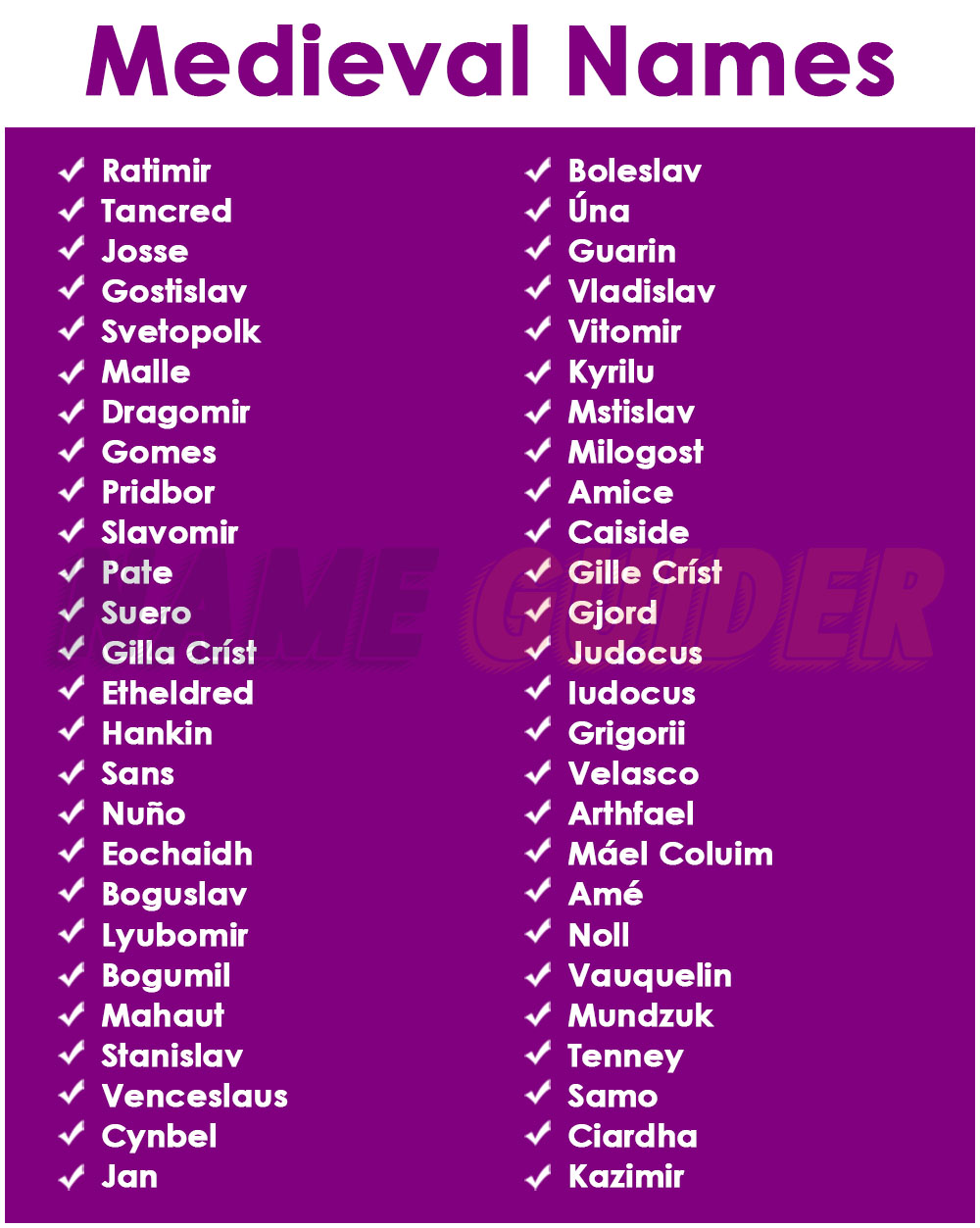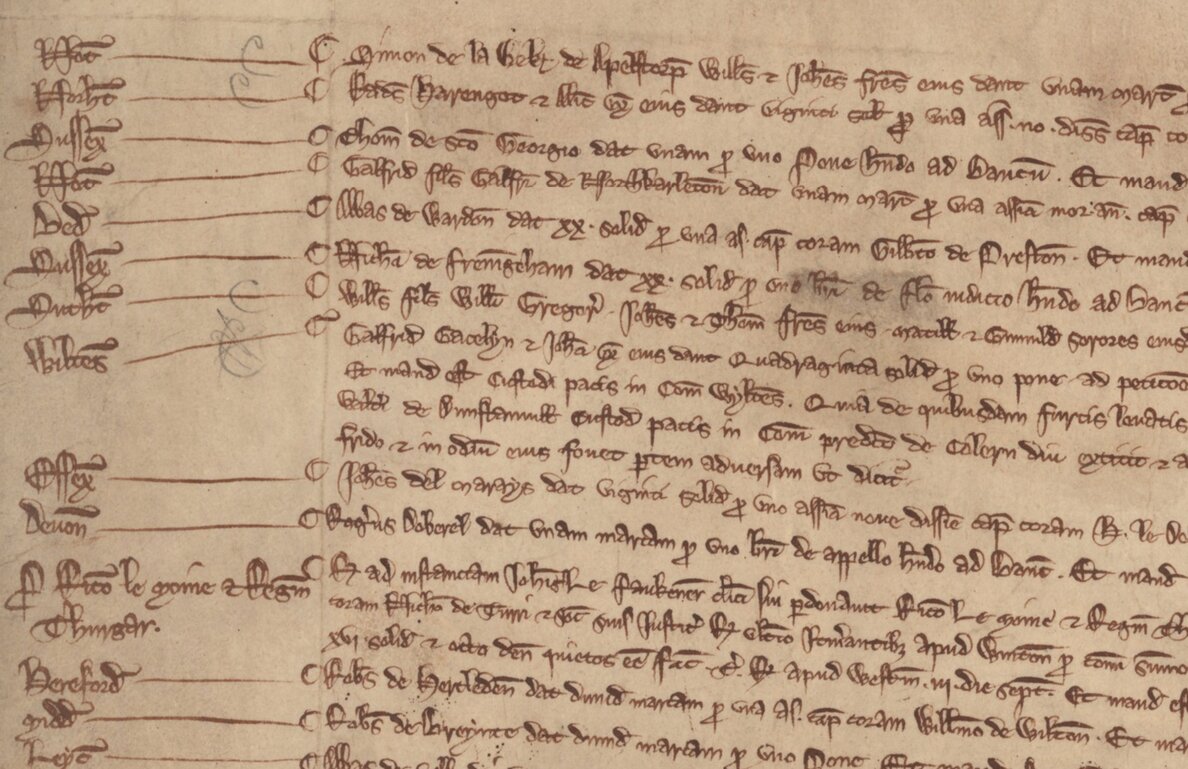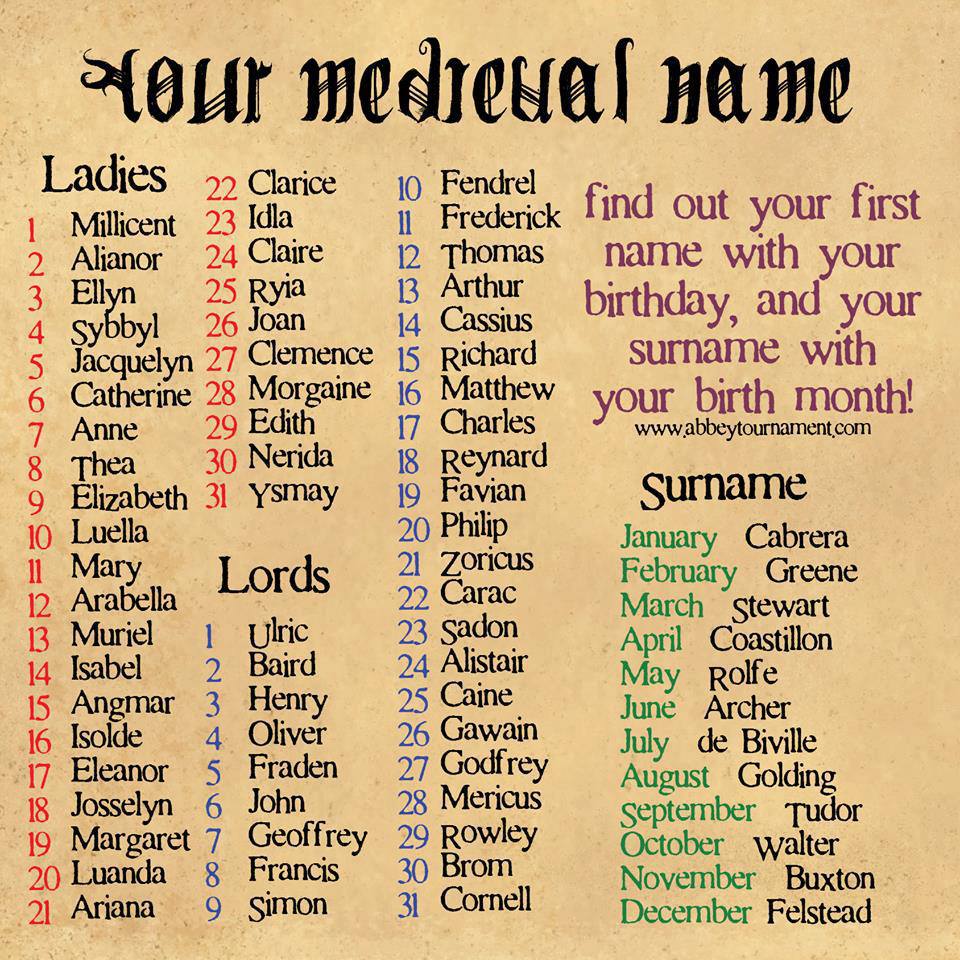Dive Into Medieval Realms: A Comprehensive Guide To Medieval Names
What are medieval names? Medieval names are the names that were used in Europe during the Middle Ages, a period of time that lasted from the fall of the Western Roman Empire in the 5th century to the beginning of the Renaissance in the 15th century.
Medieval names were typically derived from a variety of sources, including the Bible, the names of saints, and the names of places. They were often long and complex, and they often had multiple meanings. For example, the name "John" could mean "God is gracious," "beloved of God," or "the Baptist." Medieval names were also often used to indicate a person's social status. For example, the name "Sir" was used to address a knight, while the name "Lady" was used to address a woman of noble birth.
Medieval names are still used today, although they are not as common as they once were. Some popular medieval names include William, Richard, Edward, and Elizabeth. These names are often seen as being more traditional and formal than modern names, and they can be a good choice for parents who want to give their child a name with a rich history.
Medieval names can be a fascinating glimpse into the past. They can tell us about the culture and values of the people who used them, and they can help us to understand the history of our own names.
Medieval names are the names that were used in Europe during the Middle Ages, a period of time that lasted from the fall of the Western Roman Empire in the 5th century to the beginning of the Renaissance in the 15th century. They are a fascinating glimpse into the past, and they can tell us about the culture and values of the people who used them.
- Origins: Medieval names were typically derived from a variety of sources, including the Bible, the names of saints, and the names of places.
- Complexity: They were often long and complex, and they often had multiple meanings.
- Status: They were also often used to indicate a person's social status.
- Popularity: Some of the most popular medieval names include William, Richard, Edward, and Elizabeth.
- Modern Usage: Medieval names are still used today, although they are not as common as they once were.
- Cultural Significance: They can help us to understand the history of our own names.
Medieval names are a rich and varied tapestry of history and culture. They can tell us about the people who used them, the values they held, and the world they lived in. Whether you are looking for a unique and meaningful name for your child or you are simply interested in history, medieval names are a fascinating subject to explore.
Origins
The origins of medieval names are closely connected to the culture and beliefs of the people who used them. During the Middle Ages, Europe was a predominantly Christian society, and the Bible was a major source of inspiration for names. Many medieval names are derived from biblical characters, such as John, Mary, and Peter. Saints were also highly revered during this time, and many people were named after their favorite saints. For example, the name "Francis" became popular after the death of Saint Francis of Assisi in 1226.
In addition to the Bible and the names of saints, medieval names were also often derived from the names of places. This was especially common among the nobility, who often took their names from their lands or castles. For example, the surname "Fitzgerald" is derived from the Norman French phrase "fils de Gerald," meaning "son of Gerald." This surname was originally given to the illegitimate son of Gerald de Windsor, a Norman knight who fought in the Battle of Hastings in 1066.
The origins of medieval names provide us with a valuable insight into the culture and values of the people who used them. These names reflect the importance of religion, family, and social status in medieval society.
Understanding the origins of medieval names can also help us to appreciate the diversity of these names. Medieval names were not limited to a single language or culture, but were instead drawn from a variety of sources. This diversity is reflected in the wide range of medieval names that are still used today.
Complexity
The complexity of medieval names is one of their most distinctive features. Unlike modern names, which are often short and simple, medieval names were often long and complex, and they often had multiple meanings. This complexity was due to a number of factors, including the influence of the Bible, the popularity of saints' names, and the importance of social status.
- Biblical Influence: The Bible was a major source of inspiration for medieval names. Many medieval names are derived from biblical characters, such as John, Mary, and Peter. These names were often long and complex, and they often had multiple meanings. For example, the name "John" can mean "God is gracious," "beloved of God," or "the Baptist."
- Saints' Names: Saints were also highly revered during the Middle Ages, and many people were named after their favorite saints. These names were often long and complex, and they often had multiple meanings. For example, the name "Francis" became popular after the death of Saint Francis of Assisi in 1226. The name "Francis" is derived from the Latin word "Franciscus," which means "Frenchman." However, the name "Francis" also has a spiritual meaning. It can be interpreted as meaning "follower of Christ."
- Social Status: Medieval names were also often used to indicate a person's social status. For example, the name "Sir" was used to address a knight, while the name "Lady" was used to address a woman of noble birth. These names were often long and complex, and they often had multiple meanings. For example, the name "Sir" can be interpreted as meaning "lord" or "master." The name "Lady" can be interpreted as meaning "mistress" or "wife." However, when the name "Lady" was followed by a woman's maiden name, the name actually suggest that the woman was not married but had noble birth. In this sense, the use of the name still conveys a sense of the woman's social status.
The complexity of medieval names reflects the culture and values of the people who used them. These names were not simply labels, but they were also statements about a person's identity, their beliefs, and their social status. Medieval names are a fascinating glimpse into the past, and they can tell us a lot about the people who used them.
Status
In medieval society, a person's name could reveal a great deal about their social status. The names of royalty, nobility, and clergy were often long and complex, and they often included titles such as "Sir" or "Lady." Commoners, on the other hand, typically had shorter, simpler names. This distinction reflects the importance of social status in medieval society.
- Royalty and Nobility: The names of royalty and nobility were often long and complex, and they often included titles such as "Sir" or "Lady." For example, the full name of King Edward III of England was "Edwardus Dei gracia rex Anglie et Francie et dominus Hibernie," which means "Edward, by the grace of God, king of England and France and lord of Ireland."
- Clergy: The names of clergy were also often long and complex, and they often included titles such as "Father" or "Bishop." For example, the full name of Pope Gregory VII was "Hildebrandus Gregorius PP VII," which means "Hildebrand, Pope Gregory VII."
- Commoners: Commoners, on the other hand, typically had shorter, simpler names. These names were often derived from occupations, such as "Smith" or "Baker," or from personal characteristics, such as "John" or "Mary."
The use of names to indicate social status was not unique to medieval Europe. In many cultures throughout history, names have been used to distinguish between different social classes. However, the medieval period is a particularly interesting example of this phenomenon, as the social hierarchy was so rigid and the use of names was so closely regulated.
Popularity
The popularity of certain medieval names can be attributed to a variety of factors, including the influence of royalty, the popularity of saints, and the social status of the parents. For example, the name "William" was popularized by William the Conqueror, who invaded England in 1066 and established the Norman dynasty. The name "Richard" was popularized by Richard the Lionheart, who was known for his bravery and chivalry. The name "Edward" was popularized by Edward the Confessor, who was a saint and king of England. The name "Elizabeth" was popularized by Elizabeth I, who was a powerful and successful queen.
The popularity of these names also reflects the importance of social status in medieval society. The names of royalty and nobility were often adopted by commoners as a way to show their allegiance or to improve their social standing. For example, the name "John" was popular among the nobility, and it was also adopted by many commoners. The name "Mary" was popular among the peasantry, and it was also adopted by some members of the nobility.
Understanding the popularity of medieval names can help us to appreciate the culture and values of the people who used them. These names were not simply labels, but they were also statements about a person's identity, their beliefs, and their social status. Medieval names are a fascinating glimpse into the past, and they can tell us a lot about the people who used them.
Modern Usage
Despite the passage of time, medieval names continue to exert a certain allure, and they are still used by parents today. There are several reasons for this enduring popularity. First, medieval names have a timeless quality to them. They are not tied to any particular fashion or trend, and they can be used by people of all ages. Second, medieval names are often seen as being more unique and distinctive than modern names. In a world where many people have the same or similar names, a medieval name can help a child to stand out from the crowd. Third, medieval names can have a special meaning or significance for parents. For example, a parent might choose to give their child a medieval name that was borne by a saint or a historical figure that they admire.
Of course, the use of medieval names is not without its challenges. Some people may find medieval names to be too old-fashioned or difficult to pronounce. Additionally, some medieval names may have negative connotations, due to their association with historical events or figures. However, for parents who are looking for a unique and meaningful name for their child, a medieval name can be a great option.
The continued use of medieval names is a testament to their enduring appeal. These names are a reminder of our rich and varied history, and they can help us to connect with our past. Whether you are looking for a unique and distinctive name for your child or you are simply interested in history, medieval names are a fascinating subject to explore.
Cultural Significance
Medieval names are a valuable resource for understanding the history of our own names. Many modern names have their roots in medieval names, and by studying medieval names, we can learn about the origins and meanings of our own names.
- The Origins of Surnames: Many surnames that are common today can be traced back to medieval nicknames or occupations. For example, the surname "Smith" was originally given to people who worked as blacksmiths, while the surname "Cooper" was originally given to people who made barrels.
- The Evolution of Given Names: Given names have also evolved over time. Many medieval names that were once common are now considered to be old-fashioned or unusual. However, some medieval names have remained popular, and they are still used by parents today.
- The Influence of Culture: Medieval names can also tell us about the culture of the people who used them. For example, the popularity of certain saints' names can tell us about the religious beliefs of the people who used them.
Studying medieval names can help us to understand the history of our own names and the culture of the people who used them. Medieval names are a fascinating and valuable resource for anyone who is interested in history or genealogy.
Frequently Asked Questions About Medieval Names
Medieval names are a fascinating and complex topic. Here are some of the most frequently asked questions about medieval names:
Question 1: What are medieval names?
Medieval names are the names that were used in Europe during the Middle Ages, a period of time that lasted from the fall of the Western Roman Empire in the 5th century to the beginning of the Renaissance in the 15th century.
Question 2: What are some of the most popular medieval names?
Some of the most popular medieval names include William, Richard, Edward, and Elizabeth. These names were popular among all social classes, and they are still used today.
Question 3: How were medieval names chosen?
Medieval names were typically chosen from a variety of sources, including the Bible, the names of saints, and the names of places. The choice of name was often influenced by the child's social status, religious beliefs, and family history.
Question 4: Did medieval people have last names?
Most medieval people did not have last names in the modern sense. However, they often used nicknames or descriptive terms to distinguish themselves from others. These nicknames and descriptive terms were often based on a person's occupation, physical appearance, or place of origin.
Question 5: How can I find out more about medieval names?
There are a number of resources available to help you learn more about medieval names. You can find books, articles, and websites on the topic. You can also visit museums and historical sites to see examples of medieval names.
Summary: Medieval names are a fascinating and complex topic. They can tell us a lot about the culture and values of the people who used them. By studying medieval names, we can learn about the history of our own names and the origins of our culture.
Transition to the next article section: Medieval names are just one aspect of the rich and varied tapestry of medieval culture. To learn more about medieval culture, please continue reading the next section of this article.
Conclusion
Medieval names are a fascinating and complex topic. They can tell us a lot about the culture and values of the people who used them. By studying medieval names, we can learn about the history of our own names and the origins of our culture.
Medieval names are a reminder of our rich and varied history. They are a valuable resource for understanding the past and for connecting with our cultural heritage. Whether you are looking for a unique and meaningful name for your child or you are simply interested in history, medieval names are a fascinating subject to explore.



Detail Author:
- Name : Geovanni Fadel
- Username : wunsch.tyrel
- Email : kbayer@morar.com
- Birthdate : 1990-08-12
- Address : 543 Ara Ways East Leilanistad, CO 18795-9457
- Phone : 1-804-642-0344
- Company : Brakus and Sons
- Job : Telephone Operator
- Bio : Aliquam aliquid et facilis tenetur fugit. Et similique sunt voluptatibus rerum eos quas. Aliquid alias voluptatibus consequuntur nulla consequatur. Eaque quia delectus consequatur corporis.
Socials
facebook:
- url : https://facebook.com/bankunding
- username : bankunding
- bio : Esse facilis illo vero quo rerum. Non voluptatem corporis sequi rem.
- followers : 354
- following : 1152
tiktok:
- url : https://tiktok.com/@brant_official
- username : brant_official
- bio : Tempore amet id ad commodi occaecati quia non inventore.
- followers : 3434
- following : 1368